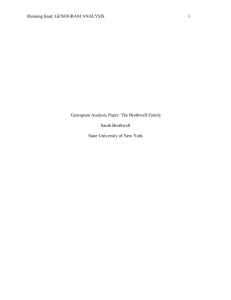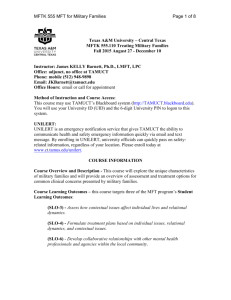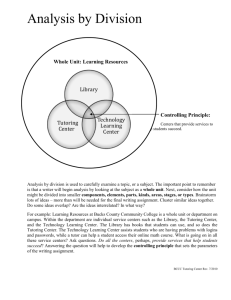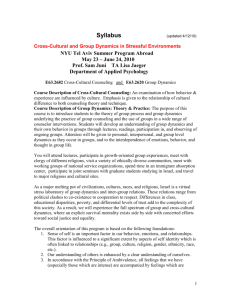CPSK 556-110/xlst with MHCK 556.110 Introduction to Family
advertisement
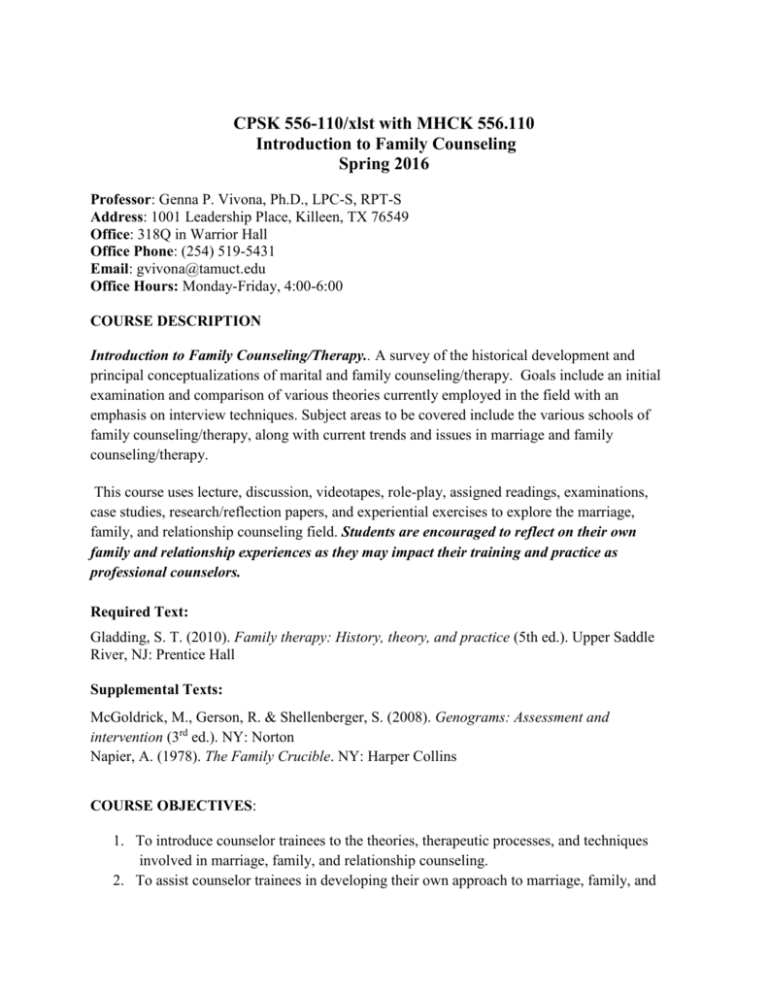
CPSK 556-110/xlst with MHCK 556.110 Introduction to Family Counseling Spring 2016 Professor: Genna P. Vivona, Ph.D., LPC-S, RPT-S Address: 1001 Leadership Place, Killeen, TX 76549 Office: 318Q in Warrior Hall Office Phone: (254) 519-5431 Email: gvivona@tamuct.edu Office Hours: Monday-Friday, 4:00-6:00 COURSE DESCRIPTION Introduction to Family Counseling/Therapy.. A survey of the historical development and principal conceptualizations of marital and family counseling/therapy. Goals include an initial examination and comparison of various theories currently employed in the field with an emphasis on interview techniques. Subject areas to be covered include the various schools of family counseling/therapy, along with current trends and issues in marriage and family counseling/therapy. This course uses lecture, discussion, videotapes, role-play, assigned readings, examinations, case studies, research/reflection papers, and experiential exercises to explore the marriage, family, and relationship counseling field. Students are encouraged to reflect on their own family and relationship experiences as they may impact their training and practice as professional counselors. Required Text: Gladding, S. T. (2010). Family therapy: History, theory, and practice (5th ed.). Upper Saddle River, NJ: Prentice Hall Supplemental Texts: McGoldrick, M., Gerson, R. & Shellenberger, S. (2008). Genograms: Assessment and intervention (3rd ed.). NY: Norton Napier, A. (1978). The Family Crucible. NY: Harper Collins COURSE OBJECTIVES: 1. To introduce counselor trainees to the theories, therapeutic processes, and techniques involved in marriage, family, and relationship counseling. 2. To assist counselor trainees in developing their own approach to marriage, family, and relationship counseling relevant to school and agency settings. 3. To promote self-assessment and self-exploration by counselor trainees concerning their family of origin experiences in order to promote optimum functionality as a professional counselor. 4. To familiarize students with the marriage, family, and relationship counseling literature. 5. To introduce students to current issues and trends in the marriage, family, and relationship counseling field. 6. To familiarize students with specific issues pertinent to marriage, family and relationship counseling (e.g., gender, sexual orientation, ethnicity, and culture). COURSE REQUIREMENTS 1. Regular class attendance and participation is required as well as blackboard participation. 2. One exam with essay topics and application questions will be given. 3. Outside projects a. GENOGRAM PROJECT. The Genogram Project has 4 parts: 1) a basic 3-generational genogram; 2) the same genogram with relational patterns added; 3) systems analysis based on your Family Of Origin (FOO); and 4) reflection on how your FOO has influenced you. The supplemental Genograms text is helpful in the preparation for this assign: accuracy of genogram representation, demonstrated knowledge of family systems constructs, overall presentation, thoroughness, and depth of interaction with material. Further directions and samples will be provided. b. CASE CONCEPTUALIZATION. Using an assigned family, select a family approach and apply this approach to the family. A handout with guidelines will be given, though basically you will include background information, assessment of the family along the lines of healthy functioning, constructs associated with this approach applied, role of the therapist, goals of treatment, and how you might use the techniques of this approach with a rationale for use. Again, your grade will be based on demonstrated applied knowledge of the constructs of the approach you select, overall presentation of the material, and thoroughness. GRADING Your grade will be determined on this basis: The following components will be equally weighted: 1. Class and blackboard participation: 25 pts of your grade 2. Final Exam: 25 pts of your grade 3. Genogram: 25 pts of your grade 4. Case conceptualization: 25 pts of your grade Thus, averaging the above: A 90 & up, B 80-89, C 70-79 Flexible Schedule Week 1, Jan 25 Introduction to course and Video class Characteristics; Family Gladding Chapter 1 Week 2, Feb 1 Week 3, Feb 8 Systems Concepts Gladding Chapter 2 of Families Family Systems Concepts Week 4, Feb 15 Hx & Process of Family Therapy Weeks 5, Feb 22 Bowen Family Therapy Gladding Chapter 9; use of genograms Experiential Family Gladding Chapter 10 DUE: Week 6, Feb 29 Week 7, March 7 Therapy, esp. Satir Genogram Project Model SPRING BREAK Weeks 9, March 21 Structural Family Therapy Gladding Chapter 12 Strategic Family Therapy Gladding Chapter 13 Week 10, March 28 Week 11, April 4 Solution-Focused Family Gladding Chapter 14 Therapy Week 12, April 11 Narrative Therapy Gladding, Chapter 14, Notes Cultural Diversity in Family Gladding Chapters 3 Week 13, April 18 Therapy Week 14, April 25, Week 15, May 2 Special Populations; Gladding: DUE: Case Ethics, Integration, Single/Blended Conceptualization Families 4, 5 Ethics, 15 Week 16, May 9 Final Examination ALL BOLDED WEEKS WILL HAVE A BLACKBOARD ASSIGNMENT COURSE AND UNIVERSITY PROCEDURES AND POLICIES Drop Policy. If you discover that you need to drop this class, you must go to the Records Office and ask for the necessary paperwork. Professors cannot drop students; this is always the responsibility of the student. The record’s office will provide a deadline for which the form must be returned, completed and signed. Once you return the signed form to the records office and wait 24 hours, you must go into Warrior Web and confirm that you are no longer enrolled. Should you still be enrolled, FOLLOW-UP with the records office immediately? You are to attend class until the procedure is complete to avoid penalty for absence. Should you miss the deadline or fail to follow the procedure, you will receive an F in the course. Academic Integrity. Texas A&M University -Central Texas values the integrity of the academic enterprise and strives for the highest standards of academic conduct. A&M-Central Texas expects its students, faculty, and staff to support the adherence to high standards of personal and scholarly conduct to preserve the honor and integrity of the creative community. Academic integrity is defined as a commitment to honesty, trust, fairness, respect, and responsibility. Any deviation by students from this expectation may result in a failing grade for the assignment and potentially a failing grade for the course. Academic misconduct is any act that improperly affects a true and honest evaluation of a student’s academic performance and includes, but is not limited to, cheating on an examination or other academic work, plagiarism and improper citation of sources, using another student’s work, collusion, and the abuse of resource materials. All academic misconduct concerns will be reported to the university’s Office of Student Conduct. Ignorance of the university’s standards and expectations is never an excuse to act with a lack of integrity. When in doubt on collaboration, citation, or any issue, please contact your instructor before taking a course of action. Disability Support and Access Services. At Texas A&M University – Central Texas, we value an inclusive learning environment where every student has an equal chance to succeed and has the right to an education that is barrier-free. The Office of Disability Support and Access is responsible for ensuring that students with a disability enjoy equal access to the University's programs, services and activities. Some aspects of this course or the way the course is taught may present barriers to learning due to a disability. If you feel this is the case, please contact Disability Support and Access at (254) 501-5831 in Warrior Hall, Ste. 212. For more information, please visit their website at www.tamuct/disabilitysupport. Any information you provide is private and confidential and will be treated as such. Tutoring. Tutoring is available to all TAMUCT students, both on-campus and online. Subjects tutored include Accounting, Finance, Statistics, Mathematics, and Writing (APA). Tutors are available at the Tutoring Center in Warrior Hall, Suite 111. Visit www.tamuct.edu/AcademicSupport and click "Tutoring Support" for tutor schedules and contact information. If you have questions, need to schedule a tutoring session, or if you are interested in becoming a tutor, contact Academic Support Programs at 254-5015836 or by emailing c.garza@tamuct.edu Chat live with a tutor 24/7 for almost any subject on your computer! Tutor.com is an online tutoring platform that enables TAMUCT students to log-in and receive FREE online tutoring and writing support. This tool provides tutoring in Mathematics, Writing, Career Writing, Chemistry, Physics, Biology, Spanish, Calculus, and Statistics. To access Tutor.com, click on http://www.tamuct.edu/departments/academicsupport/tutoring.php. University Library. The University Library provides many services in support of research across campus and at a distance. We offer over 200 electronic databases containing approximately 250,000 eBooks and 82,000 journals, in addition to the 72,000 items in our print collection, which can be mailed to students who live more than 50 miles from campus. Research guides for each subject taught at TAMUCT are available through our website to help students navigate these resources. On-campus, the library offers technology including cameras, laptops, microphones, webcams, and digital sound recorders. Research assistance from a librarian is also available twenty-four hours a day through our online chat service, and at the reference desk when the library is open. Research sessions can be scheduled for more comprehensive assistance, and may take place on Skype or in-person at the library. Assistance may cover many topics, including how to find articles in peer-reviewed journals, how to cite resources, and how to piece together research for written assignments. Our 27,000-square-foot facility on the TAMUCT main campus includes student lounges, private study rooms, group work spaces, computer labs, family areas suitable for all ages, and many other features. Services such as interlibrary loan, TexShare, binding, and laminating are available. The library frequently offers workshops, tours, readings, and other events. For more information, please visit our homepage: http://www.tamuct.edu/departments/library/index.php TECHNOLOGY REQUIREMENTS AND SUPPORT Technology Requirements. Include a statement on the technology requirements for the successful completion of the course and when applicable, information on how to access these resources (for example, how to obtain a certain software through University site license). This course will use the TAMUCT Blackboard Learn learning management system. Logon to https://tamuct.blackboard.com to access the course. Username: Your MyCT username (xx123 or everything before the "@" in your MyCT e-mail address) Initial password: Your MyCT password Check browser and computer compatibility by using the “Test Your Browser” button, found in the “Check Your Browser” module on your Blackboard dashboard, once you have logged in. Technology Support. For technology issues, students should contact Help Desk Central. 24 hours a day, 7 days a week: Email: helpdesk@tamu.edu Phone: (254) 519-5466 Web Chat: http://hdc.tamu.edu When calling for support please let your support technician know you are a TAMUCT student. For issues related to course content and requirements, contact your instructor. Technology issues are not an excuse for missing a course requirement – make sure your computer is configured correctly and address issues well in advance of deadlines


